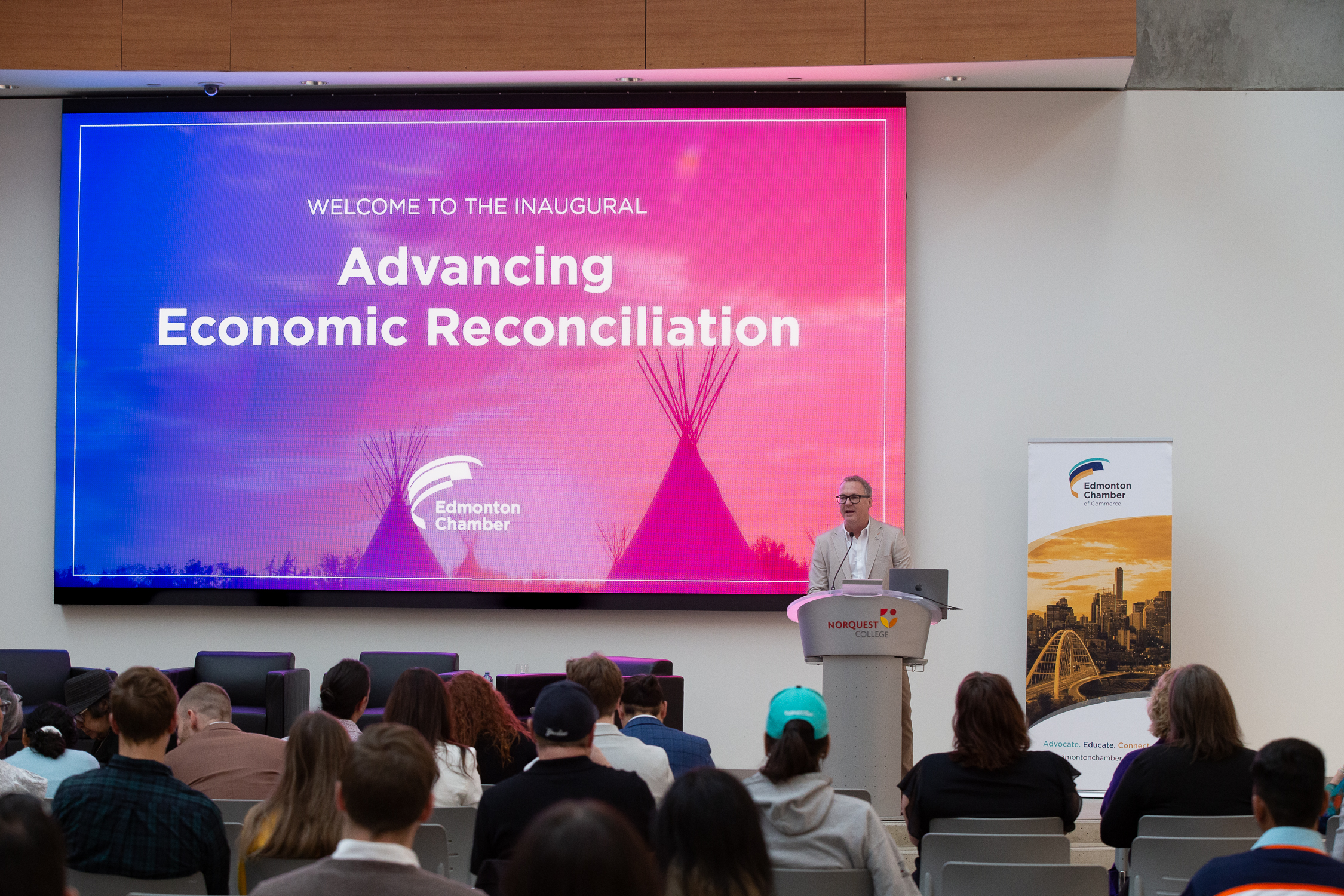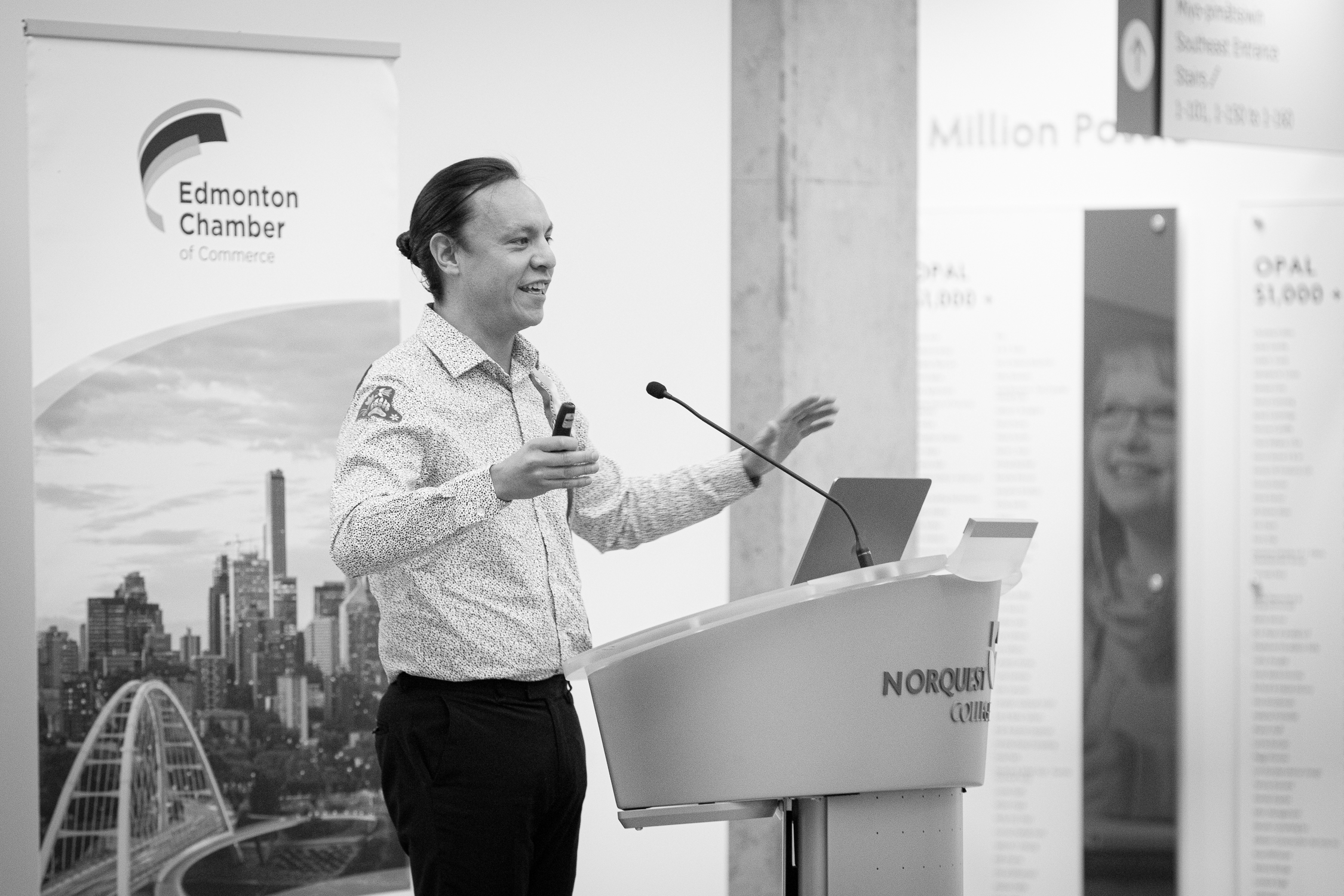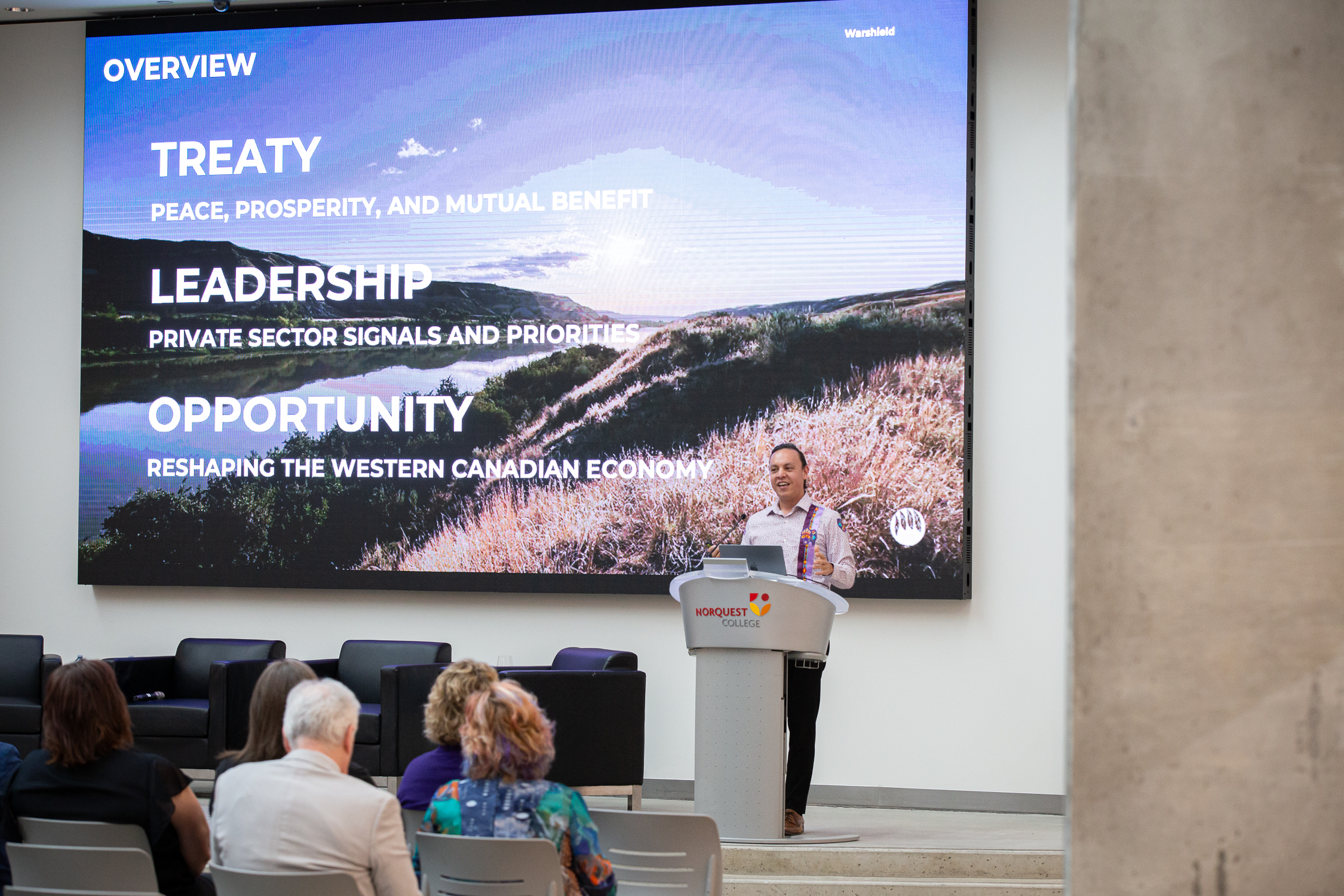Economic Reconciliation: Building Relationships and Generating Wealth With Edmonton’s Indigenous Peoples
June 25, 2024

The Edmonton Chamber of Commerce (ECC) is committed to advancing Indigenous economic prosperity. As part of that commitment, the Chamber held a transformative event for members at the atrium of NorQuest College on June 18, 2024 focused on Indigenous Economic Reconciliation. For those who couldn’t attend, here is a summation of what happened and why economic reconciliation is so important. June 21st is also National Indigenous Peoples Day - I would encourage you to take a pause and reflect on what your business doing to honour and celebrate the day.
It was an eye-opening event because, for many of us, this is the first glimpse of what economic reconciliation looks like. It is a brilliant future but with a deeply troubled past. Reconciliation is the key that allows us to move forward.
Max FineDay, a seasoned advocate for First Nations rights and CEO of the consulting firm Warshield, led the discussion by outlining the path ahead in a presentation entitled “Reshaping the Western Canadian Economy: Stats & Facts on Indigenous Wealth.”
“That’s really what the word 'reconciliation’ comes down to: setting right the relationship,” said FineDay. “That’s the work I’ve been trying to do. Bring that balance back to Treaty 6, bring that balance back to the community and bring that balance back to the country.”

It is important to note that Alberta is a land of Treaties, having been built on Treaty 6 (southern Alberta), Treaty 7 (central Alberta) and Treaty 8 (northern Alberta). You can see what land you are on Native Land. Native Land is a resource to learn more about Indigenous territories, languages, lands, and ways of life.
FineDay pointed out that Treaties are not just coloured bits on a map but have given Indigenous peoples a legal position distinct from the rest of Canada.
When the Canadian government signed Treaty 6 with Indigenous leaders in 1876, the agreement was to last “for as long as the sun shines, for as long as the grass grows and for as long as the rivers flow.”
A similar intent was articulated for all the Treaties. These were not one-off, one-time deals but living documents to guide the path forward for both Indigenous and non-Indigenous peoples.
“There was talk of peace, prosperity and mutual benefits,” said FineDay. However, he said we have seen conflicts arise because governments have not stayed true to the spirit of the Treaties.
One egregious example of how that trust was broken happened in 1910 when the Canadian government illegally seized almost half of the Siksika Nation’s reserve land in southern Alberta to sell to settlers. After decades of delay and legal fighting, the federal government acknowledged the wrongdoing and in 2022 awarded the Siksika Nation $1.3 billion in compensation.
This was not some kind of “lottery win” for the First Nation.
As Chief Ouray Crowfoot of the Siksika Nation said, “Settling this case, which dates back to 1910, is long overdue for the People of Siksika Nation. I want to make that clear: Canada is not giving $1.3 billion to Siksika. Canada is righting a wrong committed over a century ago.”
Righting a wrong. That is what economic reconciliation is all about.

FineDay’s presentation wasn’t just about relitigating past grievances but also about explaining how wrongdoings have undermined the intent of the Treaties and how we can move forward by honouring the Treaties, using leadership to avoid conflicts, and finding opportunities to grow the Western Canadian economy.
FineDay pointed to the 2022 Enbridge Equity Deal, where 23 First Nations and Metis are acquiring an almost 12 percent interest in seven northern Alberta pipelines – a deal worth $1.1 billion backed by a $250-million equity loan guarantee from the Alberta Indigenous Opportunities Corporation.
There are more than 17,000 Indigenous-owned businesses in Canada, 23 percent of which are headquartered in Alberta.
“Indigenous people today have never been better positioned to build wealth through business and partnership,” said Max FineDay.
On the panel: Chelsey Quirk, Manager of Indigenous and External Relations at Edmonton International Airport; Jed Johns, Chief Marketing Officer with the First Nations Bank of Canada; and our Chamber President Doug Griffiths



Edmonton has the second largest urban-Indigenous population in Canada and Johns raised an intriguing point about setting up an urban reserve in the city. These can be a small plot of land, an office building, a hotel or even something as workaday as a gas station. There are more than 120 urban reserves across Canada, with 65 in Saskatchewan alone, where the federal government, working with local governments, has set aside a piece of land to provide economic opportunities for the increasing number of Indigenous people living in cities. We have none in Edmonton, but the city is looking at the idea.
Johns said some sort of urban reserve could help reinvigorate the downtown core:
“Wouldn’t it be great if we had an urban reserve downtown Edmonton whether it is controlled by one First Nation or multiple First Nations and they could share the reserve land in common and have businesses there and have more First Nations people connect to the urban reserve?”
All the speakers discussed the need for businesses to reach out to Indigenous groups and create relationships.
But Quirk suggested they do more:
“We need to encourage organizations to look at their boards, We need to look at our leadership teams. We must look at our management teams and ensure that Indigenous people are part of that. Not just because we’re checking a box but because there are qualified, intelligent, Indigenous people who are willing to change the fabric of our organization for the better and contribute to reconciliation. When Indigenous people win, we all win.”
Chamber President Griffiths said economic reconciliation is the right thing to do:
“The Chamber is supposed to represent the business community and champion business, but if we don’t champion and deal with social issues, the economy falters. We are actively looking to help build whole communities and bring everyone into the success of our prosperity.”
Have your say.
The Edmonton Chamber wants to hear from you. What are the top issues and priorities for your business this spring? Start the conversation by writing to policy@edmontonchamber.com
